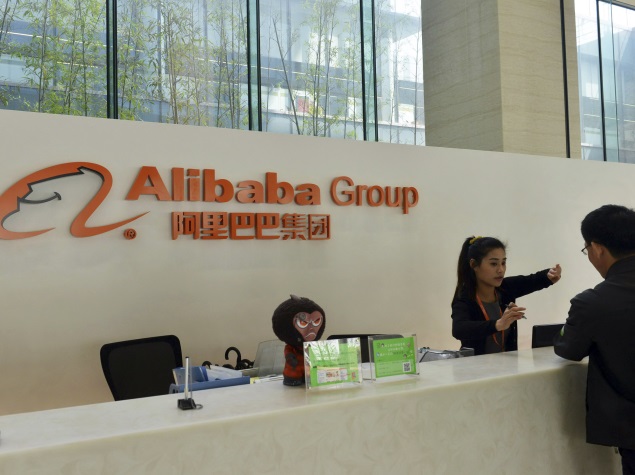- Home
- Internet
- Internet Features
- Alibaba's Cloud Ambitions Get Boost From Chinese Government Deals
Alibaba's Cloud Ambitions Get Boost From Chinese Government Deals

Alibaba this week scored a minor deal with China's northeastern port city of Dalian to build a cloud computing centre and provide online government services such as bill payment.
The pact is a small part of a growing portfolio of similar cloud services tie-ups between Alibaba and government bodies around China and comes against a backdrop of Beijing's deepening paranoia about foreign technology.
The domestic alliances will help Alibaba's cloud unit Aliyun, literally "Ali Cloud", build scale and gain experience before any global campaign to challenge market leaders Amazon Inc, Microsoft Corp and Google Inc.
"Basically, they are following the political trends and they're grabbing the business opportunities that result," said James McGregor, chairman for Greater China at U.S. communications consultancy APCO Worldwide.
"China wants control of its information, of its data, of its news, of its technology food chain, and so there are huge opportunities."
The sector has boomed as it has become cheaper for companies to store data on remote servers, or in the cloud, rather than maintaining servers in-house.
Global cloud IT infrastructure spending is expected to grow 21 percent to $32 billion (roughly Rs. 2,03,734 crores) in 2015 from a year earlier, according to U.S. market researcher IDC, and rise to $52 billion (roughly Rs. 3,31,068 crores) by 2019.
For the time being, Aliyun is small.
It accounted for just 1 percent of Alibaba's overall revenue for the year ended March 31. But it says in China it has the biggest market share in cloud computing.
Building up expertise to become a global player requires a great deal of money, time and resources. For now, Aliyun is working on expanding market share at home to profit from China's sheer scale and an unwelcoming environment for foreign cloud service providers.
Local networking
Alibaba has forged cloud agreements with more than a dozen Chinese provinces and cities including Hainan, Guangdong, Tianjin and Shanghai.
It also works with China Meteorological Administration, China Central Government Procurement Centre and the state railway service centre.
The deals range from developing cloud storage solutions to helping the government of the southern province of Guizhou gather and crunch data to optimise its traffic lights.
Aliyun in April announced a deal with state oil and gas giant China Petroleum & Chemical Corp, known as Sinopec, to create a cloud system to track its petrochemical production chain and emissions.
Cheng Jing, an Aliyun director who deals with government agencies, said his primary consideration was the bottom line.
He said the company could be a national enterprise and make contributions to China's development, citing Jack Ma, Alibaba's charismatic founder and executive chairman.
"First, we have to be sure that our services can make money," he said. "If these services can also promote Ali's relationship with the government then that's a good thing."
Alibaba is doing the right thing, said Jimmie Chang, a Beijing-based analyst at Gartner.
"Partnering with government will help Alibaba become more valuable in China, hence more valuable to the global companies to do business in China, hence more valuable to the global market."
Aliyun said last week it had partnered with a number of foreign firms to help it offer enterprise cloud computing overseas.
Those include Intel Corp, telecoms firms Singapore Telecommunications and Hong Kong's PCCW Ltd, and data centre company Equinix Inc.
This move is a step in the right direction for Aliyun and could eventually help it become a real enterprise player, analysts say.
© Thomson Reuters 2015
Catch the latest from the Consumer Electronics Show on Gadgets 360, at our CES 2026 hub.
- Samsung Galaxy Unpacked 2025
- ChatGPT
- Redmi Note 14 Pro+
- iPhone 16
- Apple Vision Pro
- Oneplus 12
- OnePlus Nord CE 3 Lite 5G
- iPhone 13
- Xiaomi 14 Pro
- Oppo Find N3
- Tecno Spark Go (2023)
- Realme V30
- Best Phones Under 25000
- Samsung Galaxy S24 Series
- Cryptocurrency
- iQoo 12
- Samsung Galaxy S24 Ultra
- Giottus
- Samsung Galaxy Z Flip 5
- Apple 'Scary Fast'
- Housefull 5
- GoPro Hero 12 Black Review
- Invincible Season 2
- JioGlass
- HD Ready TV
- Laptop Under 50000
- Smartwatch Under 10000
- Latest Mobile Phones
- Compare Phones
- Vivo Y500i
- OnePlus Turbo 6V
- OnePlus Turbo 6
- Itel Zeno 20 Max
- OPPO Reno 15 Pro Mini 5G
- Poco M8 Pro 5G
- Motorola Signature
- Vivo Y50e 5G
- Lenovo Yoga Slim 7x (2025)
- Lenovo Yoga Slim 7a
- Realme Pad 3
- OPPO Pad Air 5
- Xiaomi Watch 5
- Huawei Watch 10th Anniversary Edition
- Acerpure Nitro Z Series 100-inch QLED TV
- Samsung 43 Inch LED Ultra HD (4K) Smart TV (UA43UE81AFULXL)
- Asus ROG Ally
- Nintendo Switch Lite
- Haier 1.6 Ton 5 Star Inverter Split AC (HSU19G-MZAID5BN-INV)
- Haier 1.6 Ton 5 Star Inverter Split AC (HSU19G-MZAIM5BN-INV)












